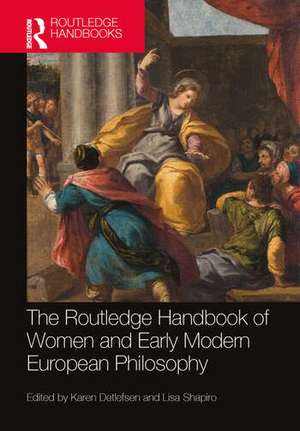The Routledge Handbook of Women and Early Modern European Philosophy: Routledge Handbooks in Philosophy
Editat de Karen Detlefsen, Lisa Shapiroen Limba Engleză Paperback – 30 ian 2025
| Toate formatele și edițiile | Preț | Express |
|---|---|---|
| Paperback (1) | 349.50 lei 3-5 săpt. | +51.61 lei 7-13 zile |
| Taylor & Francis Ltd. – 30 ian 2025 | 349.50 lei 3-5 săpt. | +51.61 lei 7-13 zile |
| Hardback (1) | 1575.79 lei 6-8 săpt. | |
| Taylor & Francis – 19 iun 2023 | 1575.79 lei 6-8 săpt. |
Din seria Routledge Handbooks in Philosophy
-
 Preț: 348.50 lei
Preț: 348.50 lei -
 Preț: 346.82 lei
Preț: 346.82 lei -
 Preț: 341.55 lei
Preț: 341.55 lei -
 Preț: 366.85 lei
Preț: 366.85 lei -
 Preț: 344.01 lei
Preț: 344.01 lei - 9%
 Preț: 1487.37 lei
Preț: 1487.37 lei -
 Preț: 341.55 lei
Preț: 341.55 lei -
 Preț: 404.99 lei
Preț: 404.99 lei -
 Preț: 346.44 lei
Preț: 346.44 lei -
 Preț: 359.03 lei
Preț: 359.03 lei -
 Preț: 359.28 lei
Preț: 359.28 lei -
 Preț: 366.16 lei
Preț: 366.16 lei -
 Preț: 349.21 lei
Preț: 349.21 lei -
 Preț: 438.66 lei
Preț: 438.66 lei -
 Preț: 345.63 lei
Preț: 345.63 lei -
 Preț: 343.72 lei
Preț: 343.72 lei -
 Preț: 346.27 lei
Preț: 346.27 lei - 9%
 Preț: 1489.80 lei
Preț: 1489.80 lei -
 Preț: 330.04 lei
Preț: 330.04 lei -
 Preț: 356.69 lei
Preț: 356.69 lei -
 Preț: 406.42 lei
Preț: 406.42 lei -
 Preț: 346.58 lei
Preț: 346.58 lei -
 Preț: 342.95 lei
Preț: 342.95 lei - 26%
 Preț: 1215.69 lei
Preț: 1215.69 lei - 30%
 Preț: 1218.56 lei
Preț: 1218.56 lei - 25%
 Preț: 1247.58 lei
Preț: 1247.58 lei - 25%
 Preț: 1222.75 lei
Preț: 1222.75 lei - 25%
 Preț: 1221.79 lei
Preț: 1221.79 lei - 18%
 Preț: 1562.46 lei
Preț: 1562.46 lei - 18%
 Preț: 1547.51 lei
Preț: 1547.51 lei - 25%
 Preț: 1220.12 lei
Preț: 1220.12 lei - 29%
 Preț: 1245.05 lei
Preț: 1245.05 lei - 18%
 Preț: 1567.41 lei
Preț: 1567.41 lei - 25%
 Preț: 1190.31 lei
Preț: 1190.31 lei - 18%
 Preț: 1571.78 lei
Preț: 1571.78 lei - 25%
 Preț: 1225.52 lei
Preț: 1225.52 lei - 25%
 Preț: 1196.43 lei
Preț: 1196.43 lei - 25%
 Preț: 1221.19 lei
Preț: 1221.19 lei - 18%
 Preț: 1565.35 lei
Preț: 1565.35 lei
Preț: 349.50 lei
Nou
Puncte Express: 524
Preț estimativ în valută:
66.88€ • 69.97$ • 55.55£
66.88€ • 69.97$ • 55.55£
Carte disponibilă
Livrare economică 12-26 martie
Livrare express 26 februarie-04 martie pentru 61.60 lei
Preluare comenzi: 021 569.72.76
Specificații
ISBN-13: 9781032496764
ISBN-10: 1032496762
Pagini: 638
Dimensiuni: 178 x 254 mm
Greutate: 1.21 kg
Editura: Taylor & Francis Ltd.
Seria Routledge Handbooks in Philosophy
ISBN-10: 1032496762
Pagini: 638
Dimensiuni: 178 x 254 mm
Greutate: 1.21 kg
Editura: Taylor & Francis Ltd.
Seria Routledge Handbooks in Philosophy
Notă biografică
Karen Detlefsen is Vice Provost for Education and Professor of Philosophy and Education at the University of Pennsylvania. She is editor of Descartes' Meditations: A Critical Guide (2013) and co-editor with Jacqueline Broad of Women and Liberty, 1600-1800: Philosophical Essays (2017).
Lisa Shapiro is Professor of Philosophy and Dean of Arts at McGill University. From 2002 to 2022, she was professor in the Department of Philosophy at Simon Fraser University. She is translator and editor of The Correspondence of Princess Elisabeth of Bohemia and René Descartes (2007), co-editor of Emotions and Cognitive Life in Medieval and Early Modern Philosophy (2013), editor of Pleasure: A History (2018), and co-editor of Modern Philosophy: An Anthology (2022).
Lisa Shapiro is Professor of Philosophy and Dean of Arts at McGill University. From 2002 to 2022, she was professor in the Department of Philosophy at Simon Fraser University. She is translator and editor of The Correspondence of Princess Elisabeth of Bohemia and René Descartes (2007), co-editor of Emotions and Cognitive Life in Medieval and Early Modern Philosophy (2013), editor of Pleasure: A History (2018), and co-editor of Modern Philosophy: An Anthology (2022).
Cuprins
1: Introduction; Part I: Context; 2: Women and Institutions in Early Modern Europe; 3: Canon, Gender, and Historiography; 4: Method, Genre, and the Scope of Philosophy; Part II: Themes; 5: God, Freedom, and Perfection in Conway, Astell, and du Châtelet; 6: Vitalistic Causation; 7: It's All Alive! Cavendish and Conway against Dualism; 8: Margaret Cavendish, Anne Conway, and Catharine Cockburn on Matter; 9: Skepticism; 10: Ways of Knowing; Part II: Section B: Natural Philosophy; 11: Space and Time; 12: Method and Explanation; 13: Physics and Optics; 14: Women, Medicine, and the Life Sciences; 15: Theories of Perception; Part II: Section C: Moral Philosophy; 16: Early Modern Women and the Metaphysics of Free Will; 17: Friendship as a Means to Freedom; 18: Managing Mockery; 19: Virtue and Moral Obligation; 20: Men, Women, Equality, and Difference; Part II: Section D: Social-Political Philosophy; 21: Autonomy and Marriage; 22: Slavery and Servitude in Seventeenth-Century Feminism; 23: Race and Gender in Early Modern Philosophy; 24: Early Modern European Women and the Philosophy of Education; 25: Critical Perspectives on Religion; 26: Beauty, Gender, and Power from Marinelli to Wollstonecraft; 27: Theories of the State; Part III: Figures; 28: Italian Women Philosophers in the Sixteenth Century; 29: Teresa de Ávila on Self-Knowledge; 30: (Self-)Portraits between Two Gowns; 31: Madeleine de Scudéry; 32: The Unorthodox Margaret Cavendish; 33: Anne Conway; 34: Gabrielle Suchon on Women's Freedom; 35: The Socratic Pedagogy of Sor Juana Inés de la Cruz; 36: Mary Astell (1666–1731); 37: Damaris Masham and Catharine Trotter Cockburn; 38: Du Châtelet and the Philosophy of Physics; 39: The Real Consequences of Imaginary Things; 40: Catharine Macaulay's Philosophy and Her Influence on Mary Wollstonecraft; 41: Phillis Wheatley and the Limits of the History of Philosophy; 42: Mary Wollstonecraft; 43: Remorse and Moral Progress in Sophie de Grouchy's Letters on Sympathy; 44: Mary Shepherd (1777–1847); 45: Women and Philosophy in the German Context; Part IV: State of the Field; 46: What Difference? The Renaissance of Women Philosophers
